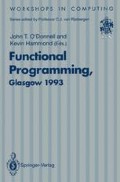Abstract
Despite recent advances, predicting the performance of functional programs on real machines remains something of a black art. This paper reports on one particularly unexpected set of results where small variations in the dynamic heap settings occasionally gave rise to significant differences in CPU performance. These performance spikes can be traced to the direct-mapped cache of the machine being benchmarked, the widely-used Sun Sparcstation 1.
Access this chapter
Tax calculation will be finalised at checkout
Purchases are for personal use only
Preview
Unable to display preview. Download preview PDF.
References
Sansom PM, “Time Profiling in a Lazy Functional Language”, This Proceedings.
Hartel P, and Vree WG, “Benchmarking Lazy Functional Languages”, Proc. FPCA 93, Copenhagen, Denmark, (June 1993).
Wakeling D and Runciman C, “Heap Profiling a Lazy Functional Compiler”, Proc. 1992 Glasgow Workshop on Functional Programming, (1992), pp. 203–214.
Clayman S, Parrott D and Clack C, “A profiling technique for lazy higher-order functional programs”, Internal Report, Department of Computing Science, University College London, (November 1991).
Peyton Jones SL, Hall CV, Hammond K, Partain WD, and Wadler PL, “The Glasgow Haskell compiler: a technical overview”, Proc. JFIT Conference, Keele, UK, (March 1993).
Sun Microcomputers Inc., Sun Performance Tuning Overview, (December 1992).
Irlam G, “The Low Level Computational Performance of Sparcstations: a Guide for Compiler Writers”, Internal Report, Dept. of Computing Science, Adelaide University.
Stone HS, High-Performance Computer Architecture, Addison-Wesley, Reading Mass., (1987).
Hammond K, “Functional Programming Languages and a Computer Architecture”, Internal Report, Dept. of Comp. Sci., Glasgow University, (June 1993).
Sansom PM, “Generational Garbage Collection for Haskell”, Proc. FPCA 93, Copenhagen, Denmark, (June 1993), pp. 106–116.
Hammond K, and Peyton Jones SL, “Profiling Scheduling Strategies on the GRIP Parallel Reducer”, Proc 4th Intl Workshop on Parallel Implementation of Functional Languages, Kuchen H and Loogen R (Eds), RWTH, Aachen, (1992).
Author information
Authors and Affiliations
Editor information
Editors and Affiliations
Rights and permissions
Copyright information
© 1994 British Computer Society
About this chapter
Cite this chapter
Hammond, K., Burn, G.L., Howe, D.B. (1994). Spiking Your Caches. In: O’Donnell, J.T., Hammond, K. (eds) Functional Programming, Glasgow 1993. Workshops in Computing. Springer, London. https://doi.org/10.1007/978-1-4471-3236-3_5
Download citation
DOI: https://doi.org/10.1007/978-1-4471-3236-3_5
Publisher Name: Springer, London
Print ISBN: 978-3-540-19879-6
Online ISBN: 978-1-4471-3236-3
eBook Packages: Springer Book Archive

